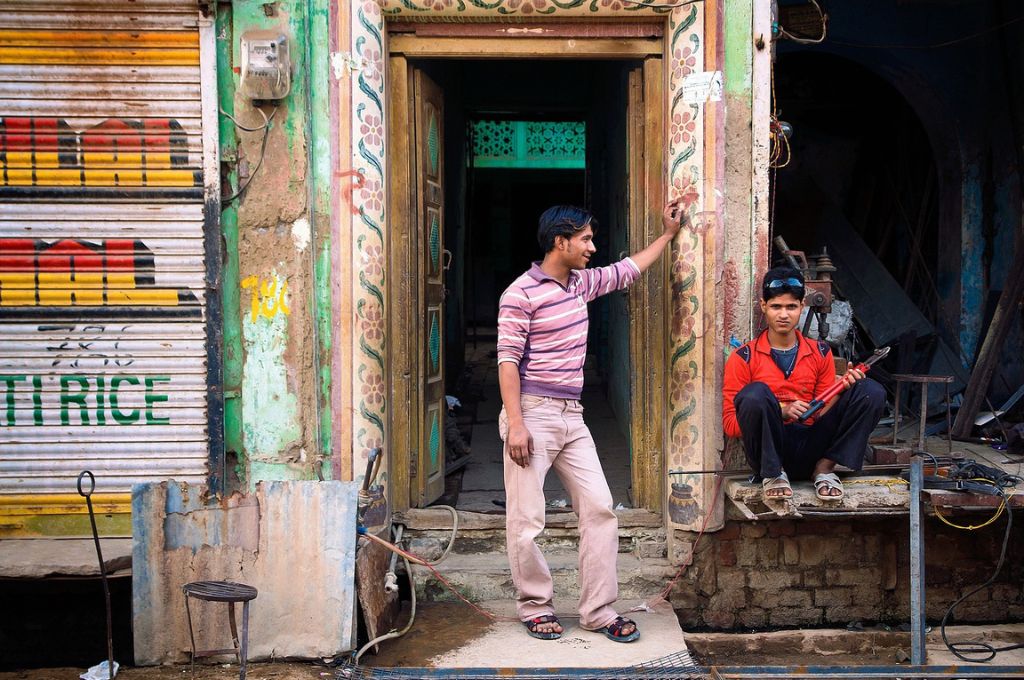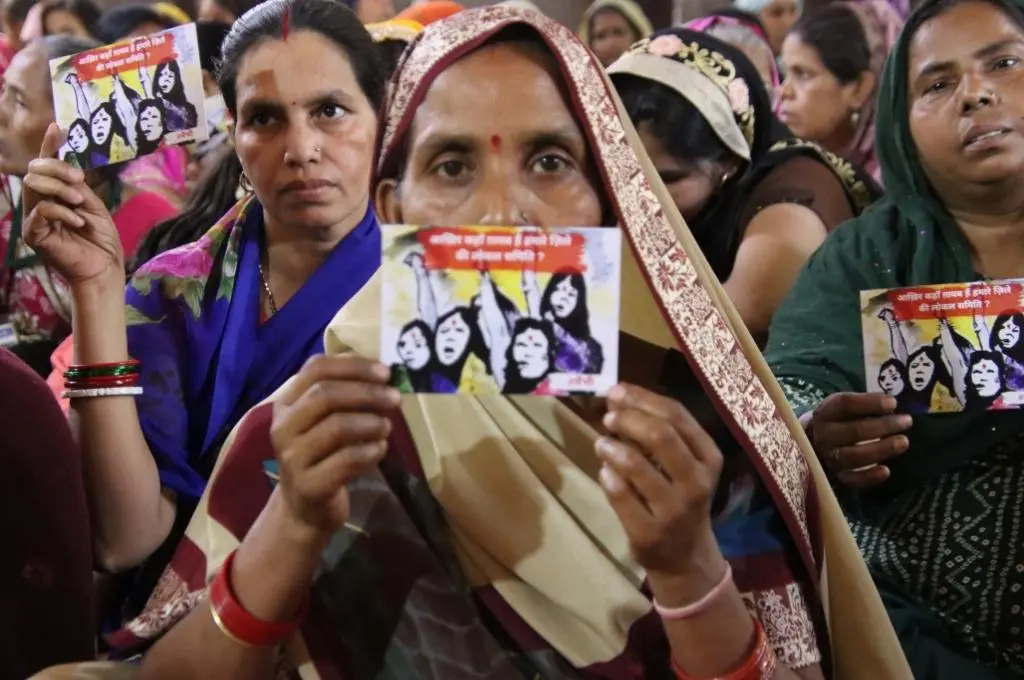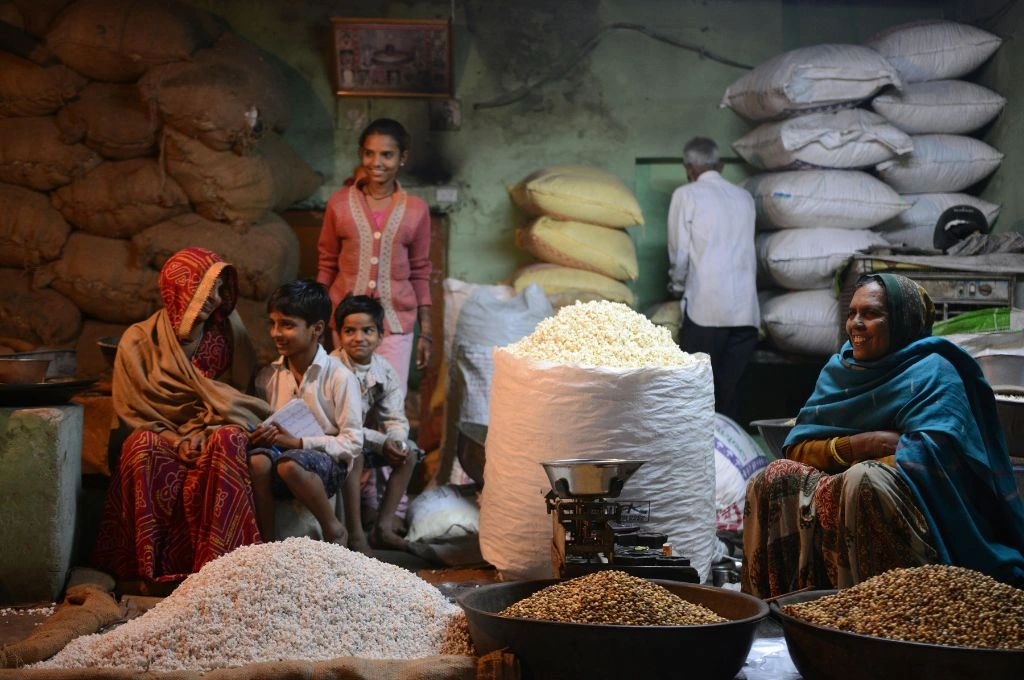As the monsoon rains lash on, 21-year-old Shubham* knows it will be a long night. He is expected to join the other men in his basti to clear the water flooding into their homes. His father is busy fulfilling other ‘manly’ duties—earning enough to feed, clothe, house, and educate his family of five. As a security guard, he spends his nights outside a tall skyscraper in Mumbai, keeping a watchful eye and saluting familiar faces.
Shubham’s life is of course vastly different from the lives of aspiring middle-class boys across India’s cities. But, arguably, there seems to be one shared reality: Shubham and his wealthier counterparts face societal pressures around what it means to be a ‘man’ in India today. In fact, no matter what one’s economic background, nobody is immune to the strict gender norms around masculinity placed on men and boys in today’s India.
To understand these pressures more deeply, Rohini Nilekani Philanthropies commissioned a study1 earlier this year. Both of us led the study, which sought to explore the anxieties and challenges young men and boys face vis-à-vis their role in relationships. We held a total of eight online focus groups with participants from SEC A and SEC C/D (two distinct parts of the socio-economic spectrum), living in Mumbai, Bengaluru, and Delhi. The question we asked these 42 boys and 12 girls was: What does it mean to be a man in India today? The overwhelming, consistent response we got: responsibility. The equivalent for girls: restrictions.
Both boys and girls articulated how adulthood creeps up gradually for boys—beginning with the innocence of childhood, followed by the realisation of responsibility in boyhood, to finally accepting responsibility, the mark of a man.
According to 15-year-old Mahesh,* “For family issues, we feel like the family (responsibility) is on our shoulders. I am in 10th, and I am small. But I get that feeling as I am maturing. But we can’t discuss that with anyone…it is understood aage kya karna hai (what we need to do next).”
So, what does responsibility look like?
1. Becoming the ‘provider’ for the entire family
For many boys, the obvious choice after completing education is to step into their father’s shoes. The primary expectation is to be the provider. This could mean earning enough for food, meeting parents’ healthcare needs, and covering all household expenses. We heard time and again in our discussions with participants that a ‘good’ son must be a role model for his siblings. Boys from lower economic backgrounds are also expected to take on the responsibility of settling the younger ones, which means educating the brother and getting the sister married.
But maturity does not happen overnight. Many boys stated that the freedom they enjoyed at a younger age was gradually reined in for family roles. Tacit norms and predefined gender roles together contribute to the expectations placed on men.
2. No room to pursue passion and interests
To take care of the family, a man needs money. To make money, he needs a stable, well-paying job. And to get such a job, he needs education in a predictable and time-tested domain. This usually limits the acceptable professions for boys to about two or three. Following your passion—music, art, bodybuilding, or even the humanities—has no ‘scope’. It is considered a long journey to an unsuccessful life. So, boys are rarely allowed to take part in such indulgent pursuits.
3. Strict boundaries for ‘acceptable’ emotions
To add to the frustration, boys are given a limited territory of emotions. An invisible yet clear boundary demarcates what is allowed and what isn’t. Displays of strength are applauded. Fear, sadness, and affection end up getting expressed as anger, contempt, or stoicism. Meanwhile, tears are a guarded secret. A 19-year-old Raghav* said, “If a boy wants to cry, it is on his bed, covered by a pillow, and under a blanket, where no one can see him.”
According to 20-year-old Aditya,* “Izzat kam ho jaayegi society mein (Our respect will reduce in society) because boys are strong and need to know how to deal with situations. They will make you feel like the weakest person if you show weakness.” Often, these bottled-up emotions find a release in loud, aggressive, and violent behaviour. As a society, why are we so afraid of boys’ tears? Maybe it has more to do with our needs than their reputation.

4. Norms around masculinity handed down through generations
When we spoke to the boys, a rare few acknowledged their fathers as role models. However, on deeper questioning, many spoke about the impact their fathers have on them. The relationship is initially distant, they said, and the mother is the protector and nurturer of the son. The father is often a shadowy figure, seen for a few hours at night when he is too tired to be interested or invested in the son. By a certain age, the relationship shifts from distance and fear to support and understanding. This is usually when the son is ready to take on the family responsibility. In this way, the idea of masculinity is passed on to the next generation.
5. Being ‘worthy’ of a wife is key
An added expectation that keeps boys under pressure is ‘ladki ke laayak banna’ (to be worthy of a girl). As girls are increasingly studying more, and earning their own incomes, they are raising the bar for men. The boys noted that the girls and young women of today can care for themselves, make decisions, voice opinions, and are less tolerant of male inadequacies. Therefore, they are looking for someone who is doing better than them in life.
So, what makes a boy deserving of a girl’s hand in marriage? According to a group of 22–24-year-old boys we interviewed, girls and their parents want everything in one person. Someone who is successful, earns well, stays in a good locality, and has a car, a respectable job, parents, and a decent group of friends. The list is long, and many boys in the study appeared to be overwhelmed by it.
6. Material success and ‘honour’ are equally important
The ultimate goal assigned to a boy is ‘to settle down’. But there are two preconditions to earning this label—material success and maintaining an honourable image. Participants in our study defined ‘honourable’ as being studious, being a non-smoker and non-drinker, and avoiding people who could distract from success. This blemish-free life will ensure marriage to a girl from a good family, they said.
7. Expectations of boys’ success are much higher than in previous generations
While these pressures are not new, boys today have a longer runway to explore and study compared to the previous generation; responsibility can wait a bit longer. Fathers who had to start working at 18 are encouraging their sons to get an MBA.
From then to now, there has been an expansion in employment opportunities too, and with that a surge in competition—not only among boys, but also among girls who are now studying more and scoring much better in exams. While the path is getting more complicated, the goalposts are shifting. No longer is a hard-working, dutiful man enough. To earn the respect of the family (and partner), the man must be ‘a winner at what he does’. The ideal is social status—highly coveted and admired by others. Mukesh Ambani came up often as a role model—an individual who is not only successful but also has status, while being a true ‘family man’.
These expectations are so rooted in our everyday life that we often fail to see the subtle (and not so subtle) ways boys are kept on track. They are expected to be competitive and be winners at everything they do. ‘If he is a part of it, he must be ahead’ seemed to be the common refrain. This competition is heightened by the ‘Sharmaji ka beta’ syndrome, with parents constantly comparing their boys to others. Even relatives come along and comment on their performance. The comparison intensifies at a marriageable age. Salary, job, and knowledge are essential when a girl’s family is looking for a suitable boy.
8. High expectations lead to intense scrutiny and even punishment
Apart from productive pursuits, boys also face judgement for just being. “Baalon ko aise kyun rakha hai? Kya junglee ki tarah reh rahe ho? Oonchi awaaz mein nahi bolna, bade ki baat sunni hai—even though we are grown up now. Parents are worried ki dost kuch sikha na de, yeh sab aadatein nahi karni chahiye.” (Why is your hair messy? You are living like a wild beast. Don’t speak in a loud and disrespectful way to elders, listen to your elders—even though we are grown up now. Parents are worried that friends will mislead us, and we will pick up bad habits.)
Their friend group is monitored, so they don’t get caught in ‘buri sangat’ (bad company). The scrutiny extends to relationships with girls. Parents and teachers look at boys with suspicion. Sharing a platonic relationship with a girl is impossible without being judged. Thirty years after the movie Maine Pyar Kiya, our youth are still conditioned to believe that “ek ladka aur ek ladki kabhi dost nahi hote” (a boy and girl can never be just friends).
Physical punishment complements these low-key methods of discipline. All the boys we spoke to have been slapped, hit, or beaten by their parents or teachers. So deep is the social conditioning that many believe they deserve physical punishment. They justify this by highlighting their own ‘inadequacies’. “Reason se maarte hain, padhai nahi ki—toh woh theek hai (They hit us for a reason, such as if we didn’t study—that is justified). Teachers hitting you is okay. If someone is teaching you, toh gussa aayega (they will get angry). Even parents hitting is fine—they are teaching us.”
A man who fails to meet the traditional demands of society is often labelled berozgaar (jobless), nikamma (useless), barbaad (ruined), kaamchor (lazy), and nalaayak (unworthy). And these are polite descriptions that the boys were willing to share with us; the norm is cuss words.
9. Being part of a ‘gang of boys’ offers protection and solidarity, but also abuse
Perhaps the one place where boys can truly belong is among their ‘gang of boys’. A tight-knit group, the boys become a bhai/dost/yaar (brother/friend) to one another. They share a unique friendship based on deep empathy and understanding of each other’s lives without saying much. Through our conversations with boys, we learned that the induction into a group of boys is identity-defining—it shapes beliefs and provides security. Once they belong, no one can harm them; the boys have their back. The group dynamics indicate the roles they play for one another—the leader, the mentor, etc.
Every boy in the group wants to prove his masculinity. So, while the gang will protect him from the outside world, teasing, roughhousing, and abuse are expected within the group. A way in which this manifests is body shaming, we were told. Boys get teased based on expectations of physicality—size, height, colour, facial hair, etc. It often goes beyond teasing to bullying with slurs like ‘mota’ (fat), ‘sukha’ (thin), ‘gitta’ (short), ‘bauna’ (dwarf), ‘kalua’ (dark-skinned), and ‘chikna’ (fair, used for gay) thrown around.
At its worst, the group becomes the ‘buri sangat’ that parents warn against. The boys are expected to conform to the group’s transgressions. These include smoking, drinking, drugs, and sometimes inappropriate expressions such as stalking and violence.
Society’s never-ending scrutiny works as a check so that boys take their responsibilities seriously. The intention is to prepare the so-called deserving gender for success. But, if we look closely, expectations are the burden a boy must bear, whether he wants to or not. The freedom, transgression, and privileges he enjoys come with an unspoken understanding. A boy’s success is the ROI that families invest in—the insurance for their old age. This was articulated by both girls and boys in the focus group discussions.
Hence, the expectation of success is not enough. A successful family man is the ideal. Someone who is not only a go-getter but also takes care of his family. An achiever who is still tied to his roots.
While the study gave us many answers, it also raised many essential questions. Is the freedom that boys enjoy conditional? Do expectations result in anxiety to live up to them? While they enjoy more advantages, does that privilege come with the pressure to perform?
Is it time to revisit some of our assumptions about young men and boys?
*Names have been changed.
—
Footnotes:
- The intention of the study was to understand the anxieties, challenges, and boys’ role in relationships. The research was conducted through online focus groups and the participants belonged to Mumbai, Bengaluru, and Delhi. The respondents were from SEC A and SEC C/D, two distinct parts of the socio-economic spectrum. The participants of six focus groups were boys from the age of 14 to 25 years (school to post college), and two focus groups consisted of post-college girls between 22 and 25 years of age. The discussions were in Hindi/English. Non-binary was not a criterion in sample selection, and this study might not reflect the views of the non-binary.
—
Know more
- Learn more about the crushing effects of patriarchy on men and women today.
- Read this report on changing gender norms to achieve lasting change.
- Read this article on constructing alternative masculinities to address gender-based violence.







